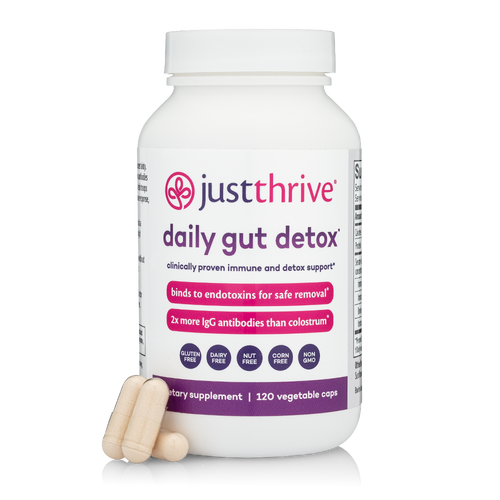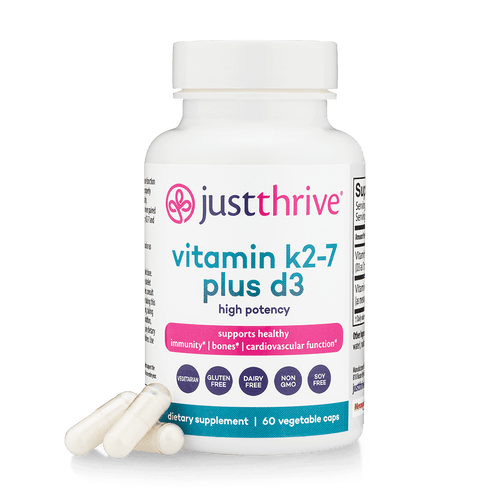Do you seem to catch whatever is going around? Feel bummed, tired, and stressed out more than you’d like? Wonder why your hair isn’t as thick and healthy as it used to be?
Chances are you’re not getting enough vitamin D. Even when it’s warm out… Even when you’re getting more exposure to the “sunshine vitamin”… Chances are you’re still running low.
Believe it or not, vitamin D deficiency is one of the most common deficiencies in the world. About 35% of all adults in the US have low vitamin D levels… and up to 50% of adults worldwide. Plus, the risk climbs as age, with 61% of older adults in the US struggling to get enough vitamin D.[1]
It’s the global health issue no one’s talking about… And it could have a serious impact on your quality of life and health.
Luckily, there’s a quick and easy way to get plenty of vitamin D… More on that in a second… But first, let’s take a look at the major red flags of a vitamin D deficiency so you can take action today to support your best health.
Deficiency Sign #1: More Sick Days, More Often
If you catch more colds than seems normal, chances are you’re low on vitamin D. Practically every cell in your immune system comes equipped with a vitamin D receptor[2], a space to absorb this essential nutrient. That shows just how crucial vitamin D is to optimal immune function.

Research shows that low levels of vitamin D are associated with all sorts of conditions including:[3,4,5,6]
- Frequent respiratory infections
- Influenza
- Pneumonia
- Bronchitis
- Rheumatoid arthritis
- Psoriasis
- Inflammatory bowel disease (IBD)
Vitamin D supports the immune system in a variety of ways. It helps regulate immune responses to infectious microbes, stimulates the breakdown of old and damaged cells, plays a role in antiviral signaling, helps guard against immune “over-reactions,” and promotes healthy inflammatory responses.[7]
So ensuring your body is getting enough vitamin D can help your immune system do its best to protect you.

Deficiency Sign #2: You Feel Depressed or Anxious
Piles of research link mental health with vitamin D… and it makes sense when you think about it.
Most of us feel better on sunny days. Depression and anxiety rates increase as the days grow shorter. And when scientists put it to the test, depressed and anxious people across the board had too-low vitamin D levels.[8,9]
In one clinical trial, researchers learned that subjects taking vitamin D for just eight weeks had significantly improved moods.[10] And a huge analysis of 25 clinical trials that included 7,583 participants found that supplementing with vitamin D:[11]
- Reduced negative emotions
- Improved quality of life
- Increased positive feelings
Your body needs vitamin D to activate production of serotonin—the “feel good” brain chemical.[12] Vitamin D also supports mental health by regulating levels of dopamine and GABA, two neurotransmitters closely associated with calm, positive moods.[13]
Deficiency Sign #3: Your Hair Is Thinning or Falling Out
If you’ve been seeing more hair on the floor or in the drain than you used to, you might be low on vitamin D. Most people don’t know this, but vitamin D plays a critical role in thick, healthy hair growth. It affects your hair in several important ways, including: [14,15]
- Managing keratin, a protein crucial for hair growth
- Regulating the hair cycle (growth, transition, then rest)
- Preserving the integrity of hair follicles
Researchers are even looking into using vitamin D as support for people struggling with stress-related hair thinning. One study that included 40 women dealing with this issue found that taking vitamin D3 (the natural, preferred form for D supplements) showed improvement in just three months.[16]

Deficiency Sign #4: You Have Weak Bones
Vitamin D is well known in the world of bone strength. After all, calcium can’t form healthy bone tissue without vitamin D. That’s because vitamin D makes calcium and other minerals available for bone building.[17]
If you’re vitamin D deficient, bones will begin to lose density. Without enough D, bone turnover speeds up[18]—meaning older bone cells get removed faster than new fresh bone cells can take their place. That leads to progressively weaker bones… which eventually leads to fractures.
Getting adequate vitamin D is crucial for keeping your bones strong, dense, and healthy.
NOTE: While vitamin D absorbs calcium and deposits it in your blood, without proper guidance, calcium has a way of wandering off to places it doesn’t belong—like your joints, soft tissue and arteries. This can cause very serious health issues. That’s why we recommend you always pair vitamin K2—the “calcium traffic cop”—with vitamin D to ensure calcium gets directed to the places it belongs (like your bones).
Deficiency Sign #5: You’re Tired or Sluggish
There’s a reason doctors suggest people struggling with low energy or fatigue go outside: Vitamin D helps boost energy, all the way down to the cellular level.
Every cell in your body has its own powerhouse called mitochondria. These powerhouses need vitamin D to function and produce energy.[19] Research shows that vitamin D deficiency—even a slight one—can lead to feelings of low energy and tiredness.[20] And the lower your levels, the more tired you may feel.[21]
So even in otherwise healthy people, low vitamin D levels can lead to fatigue… and replenishing with supplemental D can get you feeling energized again.[22]

How Am I Not Getting Enough Vitamin D?
You love being outdoors, and even if you spend your work hours mostly indoors, you feel like you still get plenty of sunshine. So how can you be low in vitamin D?
For one thing, sunscreens and other lotions can prevent your skin from absorbing the ultraviolet B rays your body uses to create vitamin D. Hats, sunglasses, and clothing can also interfere with vitamin D production.
But even if your skin does get the right amount of sunshine, your body might not convert it into the most usable form—D3—efficiently enough. The older you get, the harder it is for your body to produce enough vitamin D from sunlight alone.
The solution: Taking a high quality vitamin D3 supplement is the only way to really make sure you’re getting enough vitamin D. (And remember, you’ll want to pair vitamin K2 with your vitamin D to get the most out of your supplement and ensure maximum safety and total body health support.)
Enjoy a Mind-and-Body Health Lift with Vitamin D3
It’s surprising how many people don’t get enough vitamin D… And you may be one of them, even if you don’t realize it. Even during the warm spring and summer months when you’re outdoors all the time, it can be hard to keep vitamin D at optimal levels.
You can take proactive steps to keep your D where it needs to be with Just Thrive Vitamin K2-7 Plus D3. This pair of essential nutrients works hard to keep your mind and body healthy… from your bones to your hair to your mood to your mojo. This vitamin dream team supports:
- Healthy immunity
- Optimal cellular energy production
- Strong, dense bones and teeth
- Emotional positivity
- Healthy hair
- And so much more!
Your body craves this vitamin power couple… so give it a daily supply of unmatched support.
Want to try Just Thrive Vitamin K2-7 Plus D3 100% risk free?
Every Just Thrive purchase comes with a Bottom of the Bottle, money back guarantee.
If you’re not satisfied with your purchase for any reason, you can request a full product refund at any time. It doesn’t matter if it’s been 3 days… 3 weeks… or 3 months. It doesn’t even matter if the bottle is empty!
Sources
- Sizar O, Khare S, Goyal A, et al. Vitamin D Deficiency. [Updated 2023 Feb 19]. In: StatPearls [Internet]. Treasure Island (FL): StatPearls Publishing; 2023 Jan-. Available from: https://www.ncbi.nlm.nih.gov/books/NBK532266/
- Martens PJ, Gysemans C, Verstuyf A, Mathieu AC. Vitamin D's Effect on Immune Function. Nutrients. 2020 Apr 28;12(5):1248.
- Sîrbe C, Rednic S, Grama A, Pop TL. An Update on the Effects of Vitamin D on the Immune System and Autoimmune Diseases. Int J Mol Sci. 2022 Aug 29;23(17):9784.
- Kuang L, Liang Z, Wang C, Lin T, Zhang Y, Zhu B. Serum 25-Hydroxy Vitamin D Levels in Children with Acute Respiratory Infections Caused by Respiratory Virus or Atypical Pathogen Infection. Nutrients. 2023 Mar 20;15(6):1486..
- Grant WB, Lahore H, McDonnell SL, Baggerly CA, French CB, Aliano JL, Bhattoa HP. Evidence that Vitamin D Supplementation Could Reduce Risk of Influenza and COVID-19 Infections and Deaths. Nutrients. 2020 Apr 2;12(4):988.
- Sennekamp J. Bronchitis and asthma in the setting of vitamin D deficiency. Allergo J Int. 2014;23(4):113-114. doi: 10.1007/s40629-014-0016-2. Epub 2014 Jun 21. PMID: 26120522; PMCID: PMC4479482.
- Ismailova A, White JH. Vitamin D, infections and immunity. Rev Endocr Metab Disord. 2022 Apr;23(2):265-277.
- Geng C, Shaikh AS, Han W, Chen D, Guo Y, Jiang P. Vitamin D and depression: mechanisms, determination and application. Asia Pac J Clin Nutr. 2019;28(4):689-694.
- Tarikere Satyanarayana P, Suryanarayana R, Theophilus Yesupatham S, Reddy S, Reddy N. Is Sunshine Vitamin Related to Adolescent Depression? A Cross-Sectional Study of Vitamin D Status and Depression Among Rural Adolescents. Cureus. 2023 Feb 5;15(2):e34639. doi: 10.7759/cureus.34639. PMID: 36895546; PMCID: PMC9989901.
- Kaviani M, Nikooyeh B, Zand H, Yaghmaei P, Neyestani TR. Effects of vitamin D supplementation on depression and some involved neurotransmitters. J Affect Disord. 2020 May 15;269:28-35.
- Cheng YC, Huang YC, Huang WL. The effect of vitamin D supplement on negative emotions: A systematic review and meta-analysis. Depress Anxiety. 2020 Jun;37(6):549-564. doi: 10.1002/da.23025. Epub 2020 May 4. PMID: 32365423.
- Anjum I, Jaffery SS, Fayyaz M, Samoo Z, Anjum S. The Role of Vitamin D in Brain Health: A Mini Literature Review. Cureus. 2018 Jul 10;10(7):e2960.
- Kasatkina LA, Tarasenko AS, Krupko OO, Kuchmerovska TM, Lisakovska OO, Trikash IO. Vitamin D deficiency induces the excitation/inhibition brain imbalance and the proinflammatory shift. Int J Biochem Cell Biol. 2020 Feb;119:105665. doi: 10.1016/j.biocel.2019.105665. Epub 2019 Dec 9. PMID: 31821883.
- Saini K, Mysore V. Role of vitamin D in hair loss: A short review. J Cosmet Dermatol. 2021 Nov;20(11):3407-3414.
- Damiani G, Conic R, Orlando G, Zampetti A, Marinello E, Piai M, Linder MD. Vitamin D in trichology: a comprehensive review of the role of vitamin D and its receptor in hair and scalp disorders. G Ital Dermatol Venereol. 2020 Apr;155(2):190-197.
- Sattar F, et al. Efficacy of Oral Vitamin D3 Therapy in Patients Suffering from Diffuse Hair Loss (Telogen Effluvium). J Nutr Sci Vitaminol (Tokyo). 2021;67(1):68-71.
- Goltzman D. Functions of vitamin D in bone. Histochem Cell Biol. 2018 Apr;149(4):305-312.
- Bouillon R, et al. Skeletal and Extraskeletal Actions of Vitamin D: Current Evidence and Outstanding Questions. Endocr Rev. 2019 Aug 1;40(4):1109-1151.
- Ricca C, Aillon A, Bergandi L, Alotto D, Castagnoli C, Silvagno F. Vitamin D Receptor Is Necessary for Mitochondrial Function and Cell Health. Int J Mol Sci. 2018 Jun 5;19(6):1672.
- Zenebe G. Vitamin D Levels in Patients Presenting with Non-Specific Neuromuscular Pain and Fatigue in Ethiopia. Ethiop J Health Sci. 2020 May;30(3):337-346.
- Pennisi M, et al. Decrease in Serum Vitamin D Level of Older Patients with Fatigue. Nutrients. 2019 Oct 20;11(10):2531.
- Nowak A, et al. Effect of vitamin D3 on self-perceived fatigue: A double-blind randomized placebo-controlled trial. Medicine (Baltimore). 2016 Dec;95(52):e5353.













